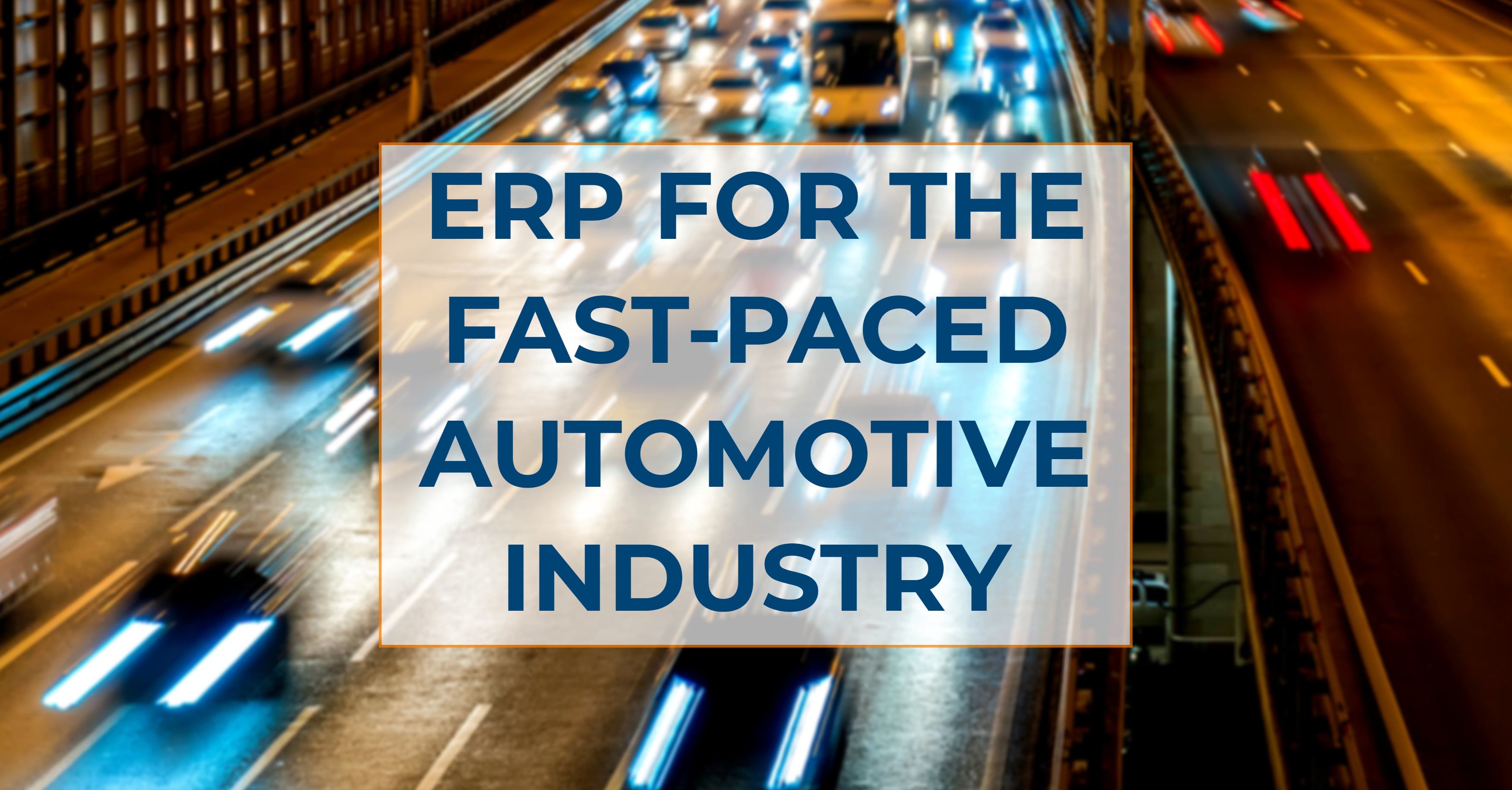ERP for Automotive Industry Changes
Recently, GM stunned the world when it announced that it’ll put an end to the production of six sedans by the end of 2019 and eliminate 15,000 jobs. This radical plan demonstrates the profound effect of customer preferences, global demand and innovation on the transportation industry. GM even boldly predicted that self-driving cars without steering cars would make its way onto roads this coming year. As automotive manufacturers work on developing electric, autonomous vehicles, businesses must make a game plan for facing new industry demands.
Embracing automotive innovation isn’t possible if manufacturers continue to rely on dated processes. To keep up with a constantly changing marketplace and drive end-to-end productivity, companies need a powerful solution that manages extensive enterprise data and streamlines operations. That solution is enterprise resource planning (ERP) software. Find out how ERP equips automotive manufacturers to thrive in a fast-paced industry.
Internet of Things
As automotive manufacturers face major changes, they’ll increasingly rely on advanced strategies, such as robotics, automation and sophisticated data analytics. At the core of all this will be the Internet of Things (IoT) and ERP. IoT objects include machinery, equipment and products that are connected to the internet, generating useful data about performance and maintenance.
With cars growing ever more sophisticated, it’s critical to gain deep insight into factory equipment and supply chain performance by combining IoT and ERP. Information from the factory floor can be instantly delivered to your ERP system, which serves as the hub for enterprise management. When an IoT machine detects a problem, you’ll receive an alert in your ERP dashboard, where you can then instantly reroute production inside an agile scheduling module. Your ERP will also analyze production data collected from shop floor machines, enabling you to detect potential problems or optimize workflows. This level of control and insight enables businesses to become more responsive and streamlined even throughout major industry changes.
Product Configurator
Everyone wants a custom product, and that’s perhaps truer for cars than anything else. However, if you can’t keep track of moving parts throughout the supply chain or have to perform manual tasks to modify orders, then customization becomes a burden that fails to add value to your manufacturing enterprise.
That’s where the product configurator (PC) comes in. When tightly integrated with your ERP system, the PC can configure parts and products, determine total order costs and estimate a lead time. Order changes are instantly captured in the Bill of Materials (BOM) to ensure quality and precision. Epicor 10 includes a particularly robust product configurator which automates the generation of part numbers and manufacturing records and provides the flexibility to change orders at the quote, sales or job level. This ability to make on-the-fly configurations is essential for the fast-paced world of automotive manufacturing.
System Flexibility
As the recent news from GM illustrates, meeting industry needs sometimes requires massive changes to the structure of your enterprise that can include mass plant closings or openings. There’s a good chance that you’ll also need to modify workflows to account for new developments. This makes a flexible, scalable ERP solution critical for staying up with the times.
Clients often find Epicor an effective solution for their ever-changing businesses. In its first Magic Quadrant for Cloud ERP, Gartner noted that customers enjoyed Epicor’s flexibility, which supported their unique processes. With a highly configurable dashboard, users can track the data and reports that are most meaningful for their jobs. Its planning and scheduling module enables users to respond quickly to production changes and create what-if scenarios to measure the impact of potential process modifications.
With ERP in the cloud, users can scale their solution to their growing business needs. Rather than build extensive servers and hardware, enterprises can scale up by simply changing their cloud service plan. ERP can also help you as you pursue international expansion. Epicor makes insight throughout global sites accessible from a single login. Country Specific Functionality (CSF) supports international accounting and reporting standards to help you maintain compliance. ERP software provides the agility to respond to industry trends.
Wrap Up
Highly adaptable ERP is the key to unlocking opportunities in the changing automotive industry. ERP helps businesses avoid succumbing to the pressures of a fast-paced market by powering innovation and efficiency. Epicor distinguishes itself by providing manufacturers and distributors with flexible and robust features and modules designed with specific industries in mind.
Datix, an Epicor Platinum Partner, has offered reliable services and solutions to an array of industries for over 20 years. We provide end-to-end support to help users navigate industry changes. A member of the Epicor Automotive Alliance (EAA), we’re one of the few Epicor partners to have proven experience in automotive ERP. We also have expertise in ERP, CRM and eCommerce, making us a one-stop shop for enterprise software. Furthermore, with our Unity integration solution, we can quickly connect your front and back-office systems to maximize the value of your software. Upgrades, implementations, customizations—our consultants do it all to drive our clients’ success.
Don’t let major developments in the automotive industry leave you in the dust. Team up with Datix for optimal ERP solutions and services!
{{cta(‘770c1544-d87d-4acb-9fc4-7a25e1385094′,’justifycenter’)}}


